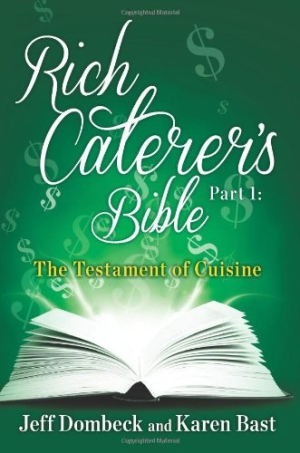The Rich Caterer's Bible
The Testament of Cuisine
Packed with straightforward guidance, useful worksheets, and industry and pricing information, this guidebook is a must-read for caterers at every level, from aspiring to established.
Written by Jeff Dombeck and Karen Bast, food industry veterans and owners of their own catering firm in Wisconsin, The Rich Caterer’s Bible may seem compact, but it actually covers a wide array of catering topics, including developing creative menu options, creating a strong business name, writing a mission statement, and controlling food quantities. The authors offer advice with a knowledgeable yet accessible tone that often sounds conversational. This approach works exceedingly well to balance out the mathematical formulas necessary to determine portion costs and operating expenses.
For example, after covering the accounting-related nuances of food left over from a catered event and discussing the legalities of giving that food to the client, the authors write, “Let’s say that you got kicked in the head by a horse, your mind was fuzzy, and you mistakenly gave the clients the leftovers. What if there’s a problem and someone gets sick from eating that leftover food? Who do you think the client’s going to blame?”
With that lively writing style, the complex information here is easily understandable and even enjoyable. Seemingly dry topics like safe food handling and bulk food purchasing are spiced up by the authors’ ability to convey advice like friendly mentors who’ve seen it all.
Most useful for caterers who want to achieve the “rich” designation promised in the book’s title, Dombeck and Bast delve into the types of cost and pricing models that can mean the difference between struggle and prosperity. “Costing out recipe ingredients is a fundamental part of catering success,” they write. “When you’re unaware of what menu items cost, you can’t really be sure if you’re making a profit.” Beyond that simple calculation, they emphasize that knowing ingredient costs enables caterers to spot large increases or decreases in price. Simple worksheets, included as part of the “Food Costing 101” chapter, give caterers a quick way to jot down costs for a variety of food items.
Every chapter, even the ones that cover nonfinancial topics such as menu selection, is geared toward boosting revenue. The authors point out that demand for experienced caterers has increased tremendously over the years and that the industry’s US sales were almost $16.5 billion in 2012. Increased competition comes as a result, so it is imperative for caterers to establish excellent money-management and organizational skills in order to achieve long-term success and, perhaps, even become rich.
Soon to be joined by a second volume focusing on service, The Rich Caterer’s Bible is a boon for those in the industry who might be challenged by savvy purchasing, accurate pricing, proper food proportioning, and other issues. Every piece of advice feels like insider information on increasing profits without significantly increasing expense or effort.
Reviewed by
Elizabeth Millard
Disclosure: This article is not an endorsement, but a review. The publisher of this book provided free copies of the book and paid a small fee to have their book reviewed by a professional reviewer. Foreword Reviews and Clarion Reviews make no guarantee that the publisher will receive a positive review. Foreword Magazine, Inc. is disclosing this in accordance with the Federal Trade Commission’s 16 CFR, Part 255.

